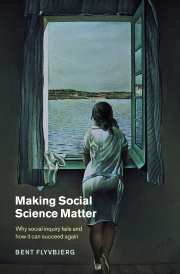2 - Rationality, body, and intuition in human learning
from Part one - Why social science has failed as science
Published online by Cambridge University Press: 05 June 2012
Summary
Our task is to broaden our reasoning to make it capable of grasping what, in ourselves and others, precedes and exceeds reason.
Maurice Merleau-PontyContext is central to understanding what social science is and can be. This chapter asks, “What role does context play in human knowledge and skills?” Philosophy of science and epistemology typically pose questions such as: “What is knowledge?”; “What can we know?”; “Under what conditions can we know that we know?” Here we will approach the question of knowledge by asking the more dynamic question: “How do people acquire knowledge and skills?” It is by addressing this question that we begin to understand the problem of context.
The intention here is not to outline and analyze all possible ways in which people acquire knowledge and skills, nor shall we review the many schools and theories that exist in this area. Rather we will deal with a single phenomenology of human learning as formulated by Hubert and Stuart Dreyfus. This particular phenomenology has been chosen because it is especially useful for understanding the linkage between knowledge and context, and because it directly addresses the question of whether knowledge about human activity can be context-independent. The answer to this latter question is decisive for an understanding and response to two fundamental epistemological questions in the study of human activity: “Are theory and epistemology possible in social science?” “Can social and political science be scientific in the same sense as is natural science?”
Information
- Type
- Chapter
- Information
- Making Social Science MatterWhy Social Inquiry Fails and How it Can Succeed Again, pp. 9 - 24Publisher: Cambridge University PressPrint publication year: 2001
